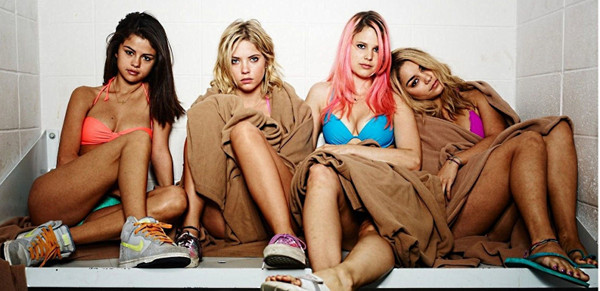
It’s not even remotely fair asking someone what they thought of Spring Breakers right upon exiting the theatre. For a film that merits as much discussion as writer/director Harmony Korine’s, it leaves me grasping for words to try and contextualize a work that rejects easy categorization. Yet Spring Breakers, for all of its chaotic resonance, is a deeply flawed film that mires itself with narrative choices that betray Korine’s ability to articulate his themes.
Part of me wants to go all in on Spring Breakers; love it long and strong and tout at as one of the year’s finer films. It may still be that, but an effort so artistically provocative and thoughtfully abstract lends itself to the scrutiny of deeper analysis. And only under such close inspection does Spring Breakers begin to pull itself apart.
If you’re a parent to daughters, and especially if you yourself have succumbed to the temptations of reckless youth in abandon, prepare for Spring Breakers to scare the shit out of you. Tony Scott’s visual style in efforts like Domino struck me as unnecessary. But seeing that style tinkered with and advanced by the likes of Refn and Korine has me rethinking my original dismissal. Korine colors his film with the refractory of a prism, constructing a visually off-kilter dream aesthetic that’s taken even further by out-of-sequence editing.
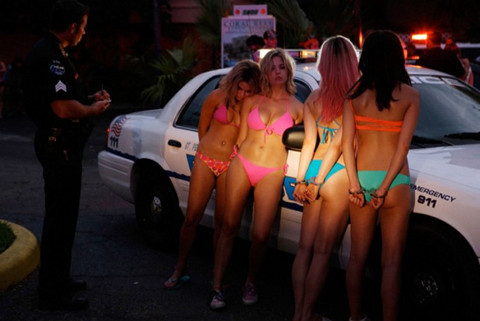
Indeed, this movie plays like it’s working backwards to piece together the events of a bender. The few scenes where Korine pulls back from this to feed the exposition happening away from the core group do a disservice to this greater approach, as if we’re no longer bystanders in a bad dream and again just watching a rudimentarily constructed film.
The film centers around four central characters pulled into the empty allure and self-degradation of a spring break getaway on the Florida coast. Candy (Vanessa Hudgens), Brit (Ashely Benson) and Cotty (Rachel Korine) are college students jaded in their daily lives. Having already roped in childhood friend and all-around good girl Faith (Selena Gomez), the girls discover they’re nowhere near the funds necessary to escape the mundanity of their repetitive lives for a few weeks; so Candy, Brit and Cotty rob a restaurant for the coin necessary to get them to Florida and live “the time of their lives.”
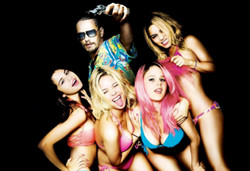 So much of the film is played off Korine’s negative view towards the rituals of spring break. Something’s rotten in our culture when this becomes the most important experience in a developmental youth’s short life. Spring Breakers plays often like a worst-case-scenario mashup of all the Girls Gone Wilds, Jersey Shores and Real Worlds in our cultural landscape – the product of counter-culture being co-opted and fed back to a youth movement that’s been willingly boxed in and marginalized more than any in recent generations.
So much of the film is played off Korine’s negative view towards the rituals of spring break. Something’s rotten in our culture when this becomes the most important experience in a developmental youth’s short life. Spring Breakers plays often like a worst-case-scenario mashup of all the Girls Gone Wilds, Jersey Shores and Real Worlds in our cultural landscape – the product of counter-culture being co-opted and fed back to a youth movement that’s been willingly boxed in and marginalized more than any in recent generations.
These are kids who haven’t lived now misconstruing hard-living for real life experience. The draw of spring break, the lie they’ve been fed of “Hey, you’ve earned this,” and their own ingrained yearning to experience the hyper-realistic falsities they’ve seen in music videos have led them to this place, and pushed them to go further than most. But it’s all empty. Where events like Woodstock were centered around ideals and effecting some sort of societal change for the better (in addition to sex and drugs), the ritual of spring break has no such allusions as Korine paints the inhabitants of his film as animalistic horn dogs high on pot, coke and ecstasy and drunk on whatever’s close at hand.
This is where the film crosses the line between fantasy and reality (until falling back into fantasy later on). It’s one thing to experience drug culture through the protective lens of a hyper-realistic music video; it’s another to dive in naked, head first into the dangers of a way of life that Hollywood has refined into high-stakes fantasy and record sales.
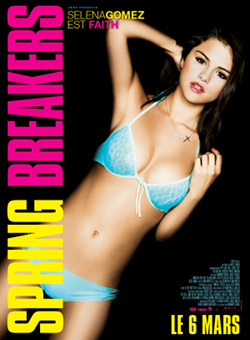
Korine’s thesis, that youth has been fed sex, drugs and violence therefore it is sex, drugs and violence they will seek, is not without resonance. Enter Alien, James Franco’s bugfuck Floridian rapper/drug pusher/sex predator who bails the girls out of jail after they’re remanded in a drug den. Alien is the fantasy fully realized: the women, the cocaine, walls lined with assault rifles. It’s as if Franco’s character is straight out of the pinnacle of TRL and music video culture when he delivers his stirring rendition of Britney Spears’ Everytime. He’s the flipside to rich white college kids checking in to check out, robbing and pillaging and screwing his way into his own tiny Scarface-esque empire. His is the sort of performance that makes me hope Franco has no further Oz films in his future. He’s clearly at his best in work like Spring Breakers where he’s engaged in the material. Franco in truth disappears into Alien and, though it’s not the career-defining turn touted by many, is still an affecting piece of work.
It’s all too much for Faith, and when she exits the film so too does Korine’s moral center. It’s as if the director becomes bored with the “temptation of the good girl” narrative and when Faith leaves, she really leaves. What makes this problematic is that Korine’s foundation is really built around Faith being present. He’s able to coax an introspective performance from Gomez who, even at 20, has a face able to convey the innocence of a child no older than 12. I hate that she gets cut from the film just as her presence is about to become even more interesting. If we’re through the looking glass, she’s clearly Alice, as the others are too busy being “hard” and “adult” to realize the gravity of the world they’re falling into. Without Alice, Wonderland seems less wondrous.
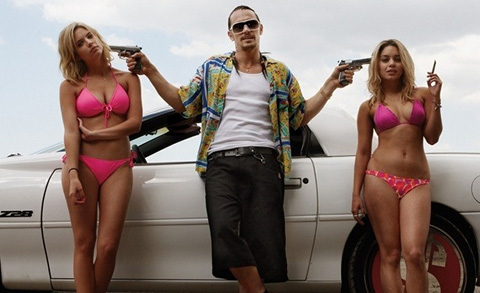
If losing a driving personality, especially one as fleshed-out and curious as Faith, proves problematic, it’s made worse by the fact that the three remaining girls are completely interchangeable for most of the film. It’s not that Hudgens, Korine or Benson are phoning it in, because that’s seriously not the case, it’s that there’s nothing to define them other than being dumb, teenage girls with an affinity toward the seedier side of life. They want to rob, snort and bang. Without the anchor Gomez provides, the film drifts to both interesting and not-so-interesting places, though it never regains its footing. The danger is in not realizing the stakes and, even though Korine makes an effort to ante it up, the remaining participants end up sleepwalking through a dangerously aggravating resolution.
By the time it ends, a balance is offset. Korine’s film becomes more light farce than dark dream. Style is traded for depth, technical craft is put in front of real storytelling prowess and the experience as a whole feels far less reverberant than some of the film’s more crucial moments. There’s so much to admire about the craft on display, but the truth within is too confounded to leave a true mark. Spring Breakers isn’t a message movie, nor is it the biting statement on youth culture that it’s clearly driving at. It’s just a movie movie; one that I respect even if I wasn’t totally on board with it.
Rating: 




Out of a Possible 5 Stars